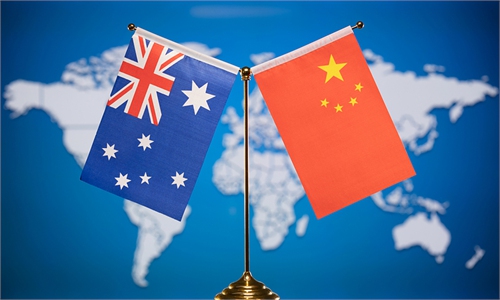Australia faces serious consequences for unreasonable provocation against China over BRI deals: observer

A woman walks in the rain in Sydney, Australia, March 20, 2021. Photo: Xinhua
Australia has essentially fired a major shot in what could lead up to a potential trade conflict with China and could face serious consequences for its "unreasonable provocation" against China, Chinese experts said on Wednesday after Canberra moved to use what has been viewed as an anti-China law to revoke agreements signed between Victoria state and China on the Belt and Road Initiative (BRI).
By tearing up the agreements, Australia's federal government is not only going over its head to provoke China but also stepping over its state jurisdiction for its own political interests which could be a serious blow to both federal and local economies, observers said.
Australian Minister of Foreign Affairs Marise Payne said that a memorandum of understanding and framework agreement the state of Victoria signed with China in relation to the BRI had been cancelled under the new Commonwealth veto laws, claiming that "the arrangement is inconsistent with Australia's foreign policy or hurts its foreign relations."
It was the first time the Australian federal government used the new veto law, which allows it to cancel agreements states and territories strike with other countries, according to media reports. The law has been widely regarded as a move primarily targeting China.
Responding to the Australian move, a spokesperson from the Chinese Embassy in Australia expressed on Wednesday a "resolute opposition" to the Australian move, calling it another "unreasonable and provocative" action taken by Australia against China.
"It further shows that the Australian government has no sincerity in improving China-Australia relations. It is bound to bring further damage to bilateral relations and will only end up hurting itself," the spokesperson said.
"The move is not only unreasonable to China but also to Victoria. It is also a deliberate provocation that goes beyond Australia's strength and could result in serious consequences," an observer told the Global Times on Wednesday.
While bilateral relations have already plunged to a near frozen state due to a series of hostile actions from Australia against China, including banning Chinese firm Huawei and interfering into China's internal affairs regarding Xinjiang and Hong Kong, the latest move marks a significant escalation that could push icy bilateral relations into an abyss, experts noted.
"By using this domestic law, Australia basically fired the first major shot against China in trade and investment," Chen Hong, a professor and director of the Australian Studies Center at the East China Normal University, told the Global Times on Wednesday.
Chen said that despite previous moves by Australia against China, Beijing has not taken "official response" in terms of trade and investment. However, the latest move appears to be a calculated and deliberate step taken by Australia against China and could prompt a response from Beijing. "China will surely respond accordingly," he said.
Australian officials have repeatedly claimed that they have been reaching out to Chinese officials to resolve issues but have not received any response from the Chinese side. Chinese officials criticized Australia for its anti-China policies and urged Canberra to take concrete actions to rectify its mistakes.
"Australian officials are fully aware of the consequences of the move, but they went ahead with it… that clearly shows Australia's intention to further escalate tensions with China rather than deescalate," Chen said.
That could inflict damage on not only Victoria's local economy but also bilateral trade between China and Australia, experts said.
"To tear up the BRI cooperation agreement from the federal perspective is a gross intervention in the development policy of the state which will inevitably have a negative impact on the economic development of Victoria in the future," Song Wei, an associate research fellow at the Chinese Academy of International Trade and Economic Cooperation, told the Global Times on Wednesday adding that "it would also worsen the China-Australia trade relationship."
Joining the BRI has brought considerable economic benefits to Victoria and created a large number of employment opportunities for the region, officials have said. Victorian Premier Daniel Andrews also defended the agreement as offering "more jobs and more trade and investment for Victorians."
Some Australian businesses, including winemakers and timber firms, have already reported losses in trade with China due to tense diplomatic relations. Last month, China imposed up to 218 percent anti-dumping duties on Australian wines for five years. China also suspended imports of timber and beef from Australia, citing violations of Chinese regulations.
Chinese officials stressed that those measures were taken in accordance with its domestic law and regulations to protect Chinese consumers.
"China has not officially responded to Australia's actions against China in terms of trade and investment," Chen said. However, Australia's intention to pick up a trade conflict with China is clear which warrants a response from China, according to Chen.



